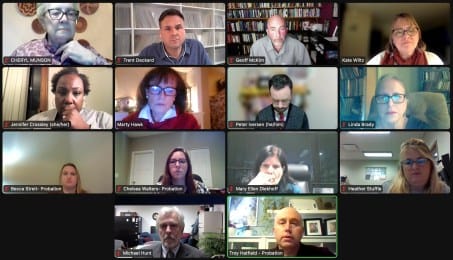Pretrial public defender money cut: Indiana awards half the grant amount Monroe County was expecting

At its Tuesday meeting, the Monroe County council dealt with the news that the state grant that has historically funded the pretrial public defender program had been cut in half for the coming year.

Instead of the $183,390 that had been requested, the county received $92,038.
That leaves the county $84,507 short for a public defender and $7,000 short for the benefits that go with a pretrial probation officer position.
According to the memo attached to Tuesday’s meeting agenda item, the funding covers a public defender who appears at initial hearings so that a “meaningful first appearance addressing bail may be held.”
A memo from staff who work in the pretrial program states that Monroe County’s pretrial services grant for 2022 was cut to half the 2021 grant level, with no advance notice. The news came on Dec. 30, according to the memo, two days before the grant is scheduled to begin.
The county council’s action on Tuesday night was to appropriate the grant funding that was awarded.
As council president Kate Wiltz put it, “Let’s appropriate what we have and get thinking on how we can keep this program going for the future.”
At the start of the meeting, Wiltz was chosen as the county council’s president for the coming year. Trent Deckard was chosen as vice president.
Attending Tuesday’s county council meeting were chief probation officer Linda Brady, deputy probation officer Troy Hatfield, chief public defender Michael Hunt, Monroe County circuit court judge Mary Ellen Diekhoff, and pretrial services program director Chelsea Walters.
The council’s generally glum mood about the grant funding cut was countered by councilor Marty Hawk’s observation that the cut had resulted from Monroe County’s past success with the pilot program.
The grant had started in 2016 when Monroe County was one of 11 counties statewide that participated in a pilot program. In 2022, the Indiana Office of Court Services (IOCS) opened the pretrial grant eligibility to any county certified to provide pretrial services.
As Hawk put it, “Now everybody wants a piece of the pie. And the pie is not really growing a whole lot.”
Hawk said, “So first of all, I think we should not be sitting here with sad faces—we were successful in what we were allowed to do during the pilot time.” She continued, “I’m saying congratulations! You did a great job. And kudos to you! Now, where do we go from here?”
Hatfield sketched out the scope of the program for county councilors. Over the past five years, Monroe County’s pretrial program has provided service to over 9,000 pretrial defendants, he said. Those are cases where the pre-trial program has been able to provide the court with additional information, so the judge can make an informed decision at the initial proceedings, which include bail hearings. The program has a 92 percent appearance rate, Hatfield said.
Making the initial appearance is one of the two goals for a pretrial program, Hatfield said. The other is for defendants to stay out of trouble while their cases pending—not getting re-arrested.
Judge Diekhoff said the grant cut is going to be detrimental to the pretrial program if there’s no public defender in the courtroom. “Having that public defender in the courtroom is extremely beneficial when we’re assessing somebody’s release, getting their questions answered, and being able to move forward more quickly, more efficiently,” Diekhoff said.
The most important thing is to make sure everybody in the room has the representation that they need, Diekhoff said.
Councilor Geoff McKim said, “I think this program is incredibly important. This is what it means when we say ‘innocent until proven guilty.’ That’s what pretrial release means.” He added, “If we say we believe in that concept, we have to operationalize it with services and resources.”
Councilor Jennifer Crossley said the statistical success of the pretrial program gives her hope. She told the staff attending the meeting that as the council’s liaison to the probation department, “I definitely look forward to working with each of you to help out in any way that I can.”
Councilor Iversen wanted to know what the prospects are for a restoration of previous pretrial grant funding levels. “Is this the new normal?” he asked.
Hatfield told Iversen that IOCS had received “plenty of feedback from across the state about the process this year.” Hatfield said he could not predict how IOCS would respond.
This year’s state legislative session is a so-called “short session,” and there won’t be a new budget adopted in 2022. Indiana’s legislature adopts a biennial budget in odd-numbered years, during sessions that run a bit longer.
Hatfield said any talks at the state level about increasing the grant funding would likely not start until 2023.




Comments ()